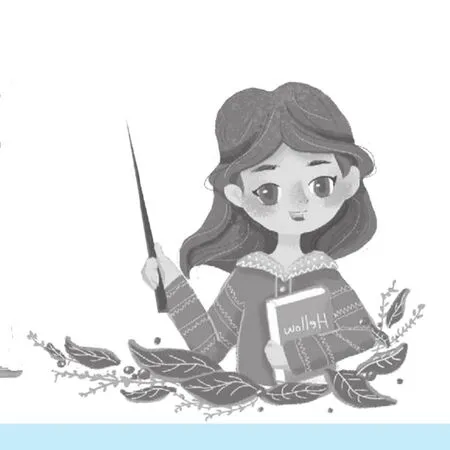代 词
2019-01-03供稿Jenny
◎供稿:Jenny

一、人称代词
人称代词是指人的代词,有性、数、格的区别。表示“我”“你”“他”“我们”“你们”“他们”。请看下表:

1. 主格在句中作主语。
例如:She is my English teacher.
2. 宾格在句中作宾语。
例如:They don’t want me to go there alone.
Don’t worry. I can look after her.
注意
1.it作为人称代词时,可以表示天气、距离、时间、环境等。
例如:It is about 10 kilometres from here.
2.it还可用作形式主语或形式宾语,来代替由不定式,动词的-ing,形式或主语从句构成的真正的主语或宾语。
例如:It is not easy to learn English well.
I found it difficult to sleep.
3. It可用于其他句型:
(1)It is time to do sth (2)It’s sb’s turn to do sth
(3)It seems that+句子 (4)It is+adj. that+句子
4.人称代词she可以用指代祖国、大地、月亮、轮船等。
例如:We love our country, we hope she’ll be stronger and stronger.
5.it指代上文出现过的同一个人或事物;指代婴儿或身份不明的人。
例如:I like the mobile phone, could you buy it for me?
Someone is knocking on the door. Who might it be?
6.英语里当主语是并列的几个人时,人称代词的排序和汉语不同:
单数形式(二、三、一)you, he, I
复数形式(一、二、三)we, you, they
但是,当受到批评或时承认错误时正好相反,I在最前,you在最后。
例如:You, he and I are all the winners.
I, Li lei and you are wrong. We should do more for the project.
二、物主代词
表示所有关系的代词叫物主代词。物主代词包括名词性物主代词和形容词性物主代词。
1.形容词性物主代词在句中具有形容词的特征。在句中作定语,后面跟名词。
例如:To our surprise, he has passed the exam.
2.名词性的物主代词具有名词的特征,在句中作主语、表语、宾语。
3.名词性物主代词可以与of连用,作定语。
例如:A friend of ours are waiting for us.
4. 形容词性物主代词+名词=名词性物主代词
—Where is my pen?
—Oh, sorry. I have taken yours by mistake.
5. 形容词性物主代词与own连用,如:on my own我自己
三、反身代词
用来表示“某人自己”的代词称为反身代词。如下表所示:

1.反身代词在句中常用宾语,主语或宾语的同位语。例如:
Her sister is too young to dress herself.
He himself is always making such mistakes.
You’d better ask your wife herself.
2.反身代词可与其他词构成固定搭配,例如:
make oneself at home teach oneself learn by oneself
help oneself to enjoy oneself look after oneself
dress oneself hurt oneself leave sb by oneself
3.oneself变为复数时,把f改为v+es
四、指示代词
表示时间和空间远近关系的代词叫指示代词。见下表:

指示代词可在句中作主语、宾语、表语、定语等。例如:
Those are my parents. (作主语)
Throw it like that.(作表语)
The toys little Tom likes are those in the basket. (作表语)
These pictures are drawn by an old blind man. (作定语)
注意
1.指前面提到过的东西,常用that,those表示。
例如:I’m sorry to hear that.
2.指下文将要提到的事情,可用this,These表示。
3.在打电话用语中,this代替自己,而that代替对方—This is Tom speaking.
—Who is that ?
五、疑问代词
用来构成特殊疑问句的代词叫疑问代词。常用的有:who, what,which,whose,whom,在句中常作主语、宾语、定语、表语。

六、不定代词
不定代词没有确定的对象。
1.初中阶段常用普通不定代词表格如下:

2.普通不定代词的用法
(1)some与any
some和any均表示一些,既可修饰可数名词又可以修饰不可数名词:
some一般用于肯定句,any用于疑问句、否定句和条件句中。但在疑问句中,当表示说话人希望得到肯定回答或表达请求、建议时应用some。
(2)many和much
many修饰可数名词复数,much修饰不可数名词;many和much都可和表示程度副词so,too,as,how连用。
(3)either与neither
either“两者之一”;neither“两者都不”:常构成的固定搭配
either/neither of名词(代词)+谓语动词第三人称单数形式;
当either…or…和neither…nor…连接两个主语时,谓语动词要用就近原则。
注意
either还可用于否定句,表示“也”。
(4)both和all
both“两者都”;常与and搭配,谓语动词用复数。all“三者或三者以上都”,常与of连在一起。
注意
both…and…= not only…but (also)…,但是both…and…连接两个主语时,谓语动词用复数;而not only…but (also)…连接两个主语时,谓语动词遵循就近一致原则。
(5)little a little;few;a few

(6) it;one;that;
① it 特指上下文提到的同一对象,是同一事物。如:
The book is mine. It’s very interesting.
② one 泛指上下文提及的同类事物中的一个,同类而不同物。如:
—Who has a pen?
—I have one.
③ that 常用于比较级结构中,代替前面提到的可数名词或者不可数名词名词,以避免重复。当名词是可数名词复数时用those代替that。
如:The weather in Beijng is colder than that in Guangzhou in winter.
七、复合不定代词
初中阶段常用复合不定代词列表如下:

(1) 当形容词或者else修饰复合不定代词something ,everything ,everyone 等时,形容词或else必须放在这些不定代词之后;如:
Can you find someone else?
(2) some—类不定代词一般用于肯定句,也可用于表示希望得到肯定回答的疑问句中;any—类不定代词常用于否定句、疑问句或条件句中。如:
There is somebody who wants to speak to you.
He doesn’t want to do anything.
(3)复合不定代词做主语时,谓语动词用单数。
主谓一致(实战演练)
( ) 1.When I returned to my hometown, I was nearly lost. Almost_______ had changed.
A. nothing B. anything C. something D. everything
( ) 2.I hope I can see the famous man _________ in the future.
A. times B. sometimes C. some times D. sometime
( ) 3. Betty is a new student in our class. We know _______ about her except her name.
A. something B. anything C. nothing D. everything
( ) 4. Hello! I have _______ to tell you.
A. important something B. anything important
C. something important D. important anything
( ) 5.—Where is my notebook?
—I don’t know. It isn’t here. Maybe ___________ took it away.
A. everybody B. nobody C. anybody D. somebody
( ) 6. Did you find _______?
A. unusual something B. something unusual
C. unusual anything D. anything unusual
( ) 7. Would you like ______ to drink?
A. other something B. something other
C. something else D. else something
( ) 8. — Did you meet ______ interesting at the party?
— Not really.
A. anybody B. somebody C. everybody D. nobody
( ) 9. Mike never listens to ______ except his uncle.
A. someone B. no one C. everyone D. anyone
( ) 10._____ of the twins has been there before.
A. Both B. Neither C. all D. None
( ) 11.If_____ calls, tell_____ I’ll come back soon.
A. everyone; him B. someone; them
C. anyone; him D. anybody, them
( ) 12. He told me he would tell us _____ .
A. surprising something B. surprising anything
C. something surprised D. something surprising
答案1—5. D D C C D 6—10. D C A D B 11—12. C D
